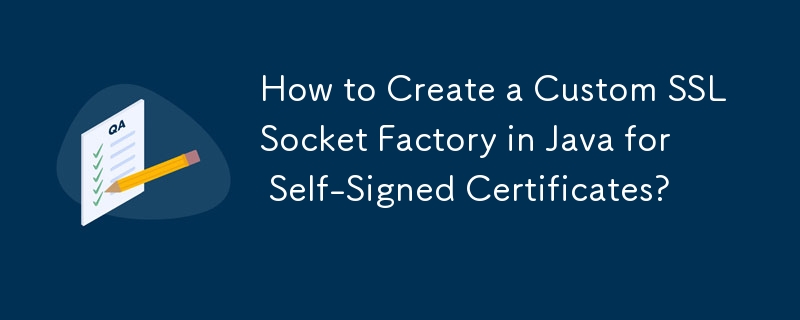 Java
Java
 javaTutorial
javaTutorial
 How to Create a Custom SSLSocket Factory in Java for Self-Signed Certificates?
How to Create a Custom SSLSocket Factory in Java for Self-Signed Certificates?
How to Create a Custom SSLSocket Factory in Java for Self-Signed Certificates?

Custom SSL Socket Factory for Self-Signed Certificates
To connect to a website using a self-signed certificate, Java applications must modify their default behavior. Here's how to achieve your goals without compromising using a custom SSLSocket factory:
-
Create an SSLSocket Factory:
- Initialize a KeyStore that stores the self-signed certificate as a trusted entry.
- Initialize a TrustManagerFactory with the KeyStore.
- Initialize an SSLContext with the TrustManagerFactory.
- Retrieve the SSLSocketFactory from the SSLContext.
-
Set the SSLSocket Factory:
- Before connecting to the website, set the SSLSocketFactory on the HttpsURLConnection.
Example Code:
import javax.net.ssl.*;
import java.io.FileInputStream;
import java.security.KeyStore;
public class CustomSSLContext {
public static SSLSocketFactory getSSLSocketFactory() {
// Load the keystore with the self-signed certificate
KeyStore keyStore = KeyStore.getInstance(KeyStore.getDefaultType());
keyStore.load(new FileInputStream("truststore.jks"), "password".toCharArray());
// Create a TrustManagerFactory and initialize it with the keystore
TrustManagerFactory tmf = TrustManagerFactory.getInstance(TrustManagerFactory.getDefaultAlgorithm());
tmf.init(keyStore);
// Create an SSLContext and initialize it with the TrustManagerFactory
SSLContext sslContext = SSLContext.getInstance("TLS");
sslContext.init(null, tmf.getTrustManagers(), null);
// Get the SSLSocketFactory from the SSLContext
return sslContext.getSocketFactory();
}
public static void main(String[] args) {
// Create an HttpsURLConnection with the custom SSLSocketFactory
URL url = new URL("https://host.example.com/");
HttpsURLConnection conn = (HttpsURLConnection) url.openConnection();
conn.setSSLSocketFactory(getSSLSocketFactory());
// Send the request to the website
conn.setMethod("POST");
conn.getOutputStream().write("data".getBytes());
// Read the response from the website
conn.getInputStream().read();
}
}This approach allows you to connect to the website using the self-signed certificate without affecting other connections in the application or requiring modifications to the JRE.
The above is the detailed content of How to Create a Custom SSLSocket Factory in Java for Self-Signed Certificates?. For more information, please follow other related articles on the PHP Chinese website!

Hot AI Tools

Undresser.AI Undress
AI-powered app for creating realistic nude photos

AI Clothes Remover
Online AI tool for removing clothes from photos.

Undress AI Tool
Undress images for free

Clothoff.io
AI clothes remover

Video Face Swap
Swap faces in any video effortlessly with our completely free AI face swap tool!

Hot Article

Hot Tools

Notepad++7.3.1
Easy-to-use and free code editor

SublimeText3 Chinese version
Chinese version, very easy to use

Zend Studio 13.0.1
Powerful PHP integrated development environment

Dreamweaver CS6
Visual web development tools

SublimeText3 Mac version
God-level code editing software (SublimeText3)

Hot Topics
 1663
1663
 14
14
 1420
1420
 52
52
 1315
1315
 25
25
 1266
1266
 29
29
 1239
1239
 24
24
 Is the company's security software causing the application to fail to run? How to troubleshoot and solve it?
Apr 19, 2025 pm 04:51 PM
Is the company's security software causing the application to fail to run? How to troubleshoot and solve it?
Apr 19, 2025 pm 04:51 PM
Troubleshooting and solutions to the company's security software that causes some applications to not function properly. Many companies will deploy security software in order to ensure internal network security. ...
 How do I convert names to numbers to implement sorting and maintain consistency in groups?
Apr 19, 2025 pm 11:30 PM
How do I convert names to numbers to implement sorting and maintain consistency in groups?
Apr 19, 2025 pm 11:30 PM
Solutions to convert names to numbers to implement sorting In many application scenarios, users may need to sort in groups, especially in one...
 How to simplify field mapping issues in system docking using MapStruct?
Apr 19, 2025 pm 06:21 PM
How to simplify field mapping issues in system docking using MapStruct?
Apr 19, 2025 pm 06:21 PM
Field mapping processing in system docking often encounters a difficult problem when performing system docking: how to effectively map the interface fields of system A...
 How does IntelliJ IDEA identify the port number of a Spring Boot project without outputting a log?
Apr 19, 2025 pm 11:45 PM
How does IntelliJ IDEA identify the port number of a Spring Boot project without outputting a log?
Apr 19, 2025 pm 11:45 PM
Start Spring using IntelliJIDEAUltimate version...
 How to safely convert Java objects to arrays?
Apr 19, 2025 pm 11:33 PM
How to safely convert Java objects to arrays?
Apr 19, 2025 pm 11:33 PM
Conversion of Java Objects and Arrays: In-depth discussion of the risks and correct methods of cast type conversion Many Java beginners will encounter the conversion of an object into an array...
 How to elegantly obtain entity class variable names to build database query conditions?
Apr 19, 2025 pm 11:42 PM
How to elegantly obtain entity class variable names to build database query conditions?
Apr 19, 2025 pm 11:42 PM
When using MyBatis-Plus or other ORM frameworks for database operations, it is often necessary to construct query conditions based on the attribute name of the entity class. If you manually every time...
 E-commerce platform SKU and SPU database design: How to take into account both user-defined attributes and attributeless products?
Apr 19, 2025 pm 11:27 PM
E-commerce platform SKU and SPU database design: How to take into account both user-defined attributes and attributeless products?
Apr 19, 2025 pm 11:27 PM
Detailed explanation of the design of SKU and SPU tables on e-commerce platforms This article will discuss the database design issues of SKU and SPU in e-commerce platforms, especially how to deal with user-defined sales...
 How to use the Redis cache solution to efficiently realize the requirements of product ranking list?
Apr 19, 2025 pm 11:36 PM
How to use the Redis cache solution to efficiently realize the requirements of product ranking list?
Apr 19, 2025 pm 11:36 PM
How does the Redis caching solution realize the requirements of product ranking list? During the development process, we often need to deal with the requirements of rankings, such as displaying a...



